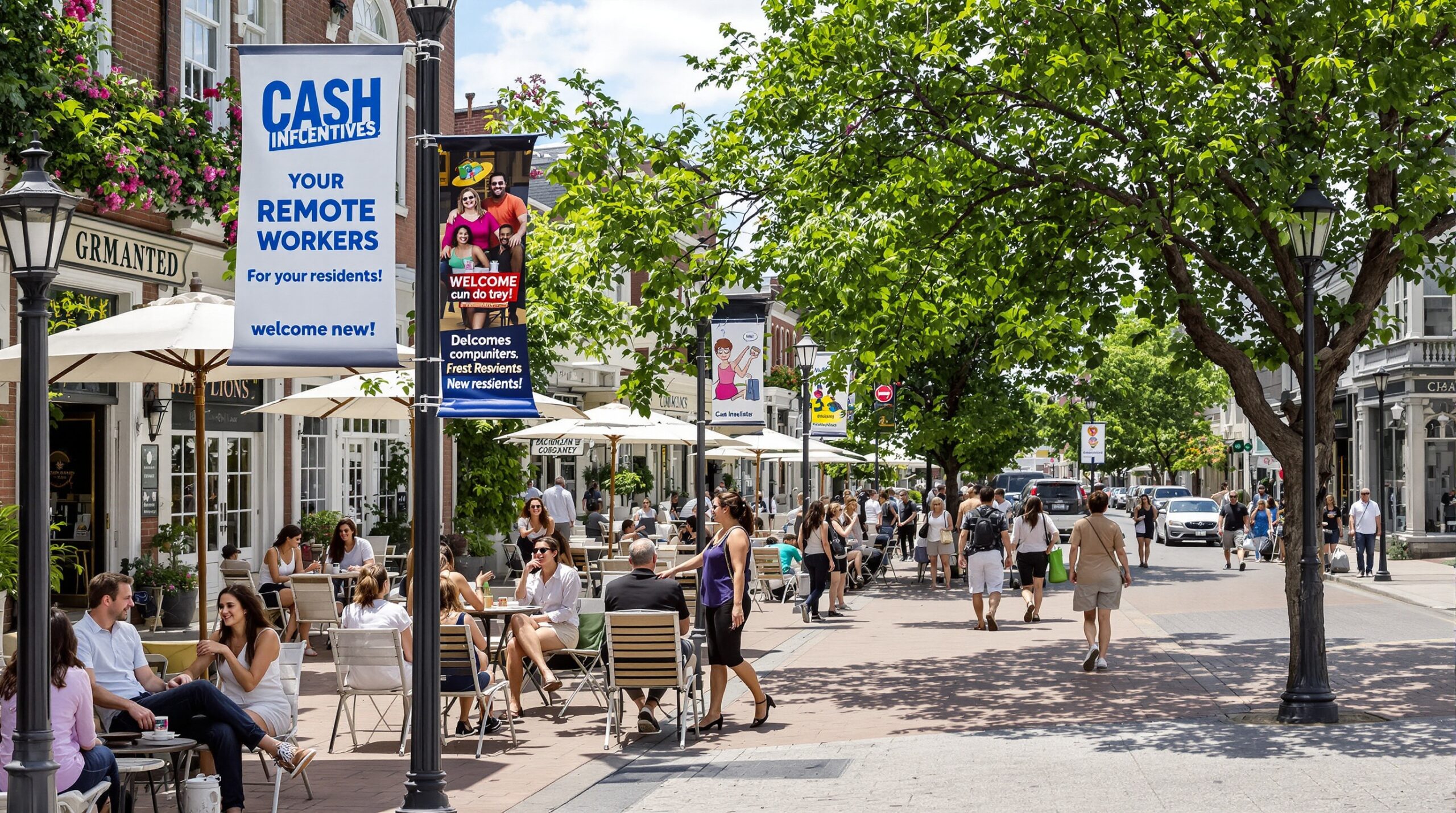Remote work has transformed the job market and residential preferences for millions of professionals. As urban migration patterns shift, small towns face a unique opportunity to revitalize local economies. To seize this moment, many communities are offering attractive cash incentives to persuade remote workers to relocate. This new approach is rewriting the blueprint for rural growth and workforce diversification.
Why Small Towns Are Embracing Cash Incentives
Many small towns struggle with declining populations and limited economic opportunities. Young adults often leave for bigger cities after finishing school. As a result, local businesses face workforce shortages, and tax bases shrink. By offering cash incentives, these communities hope to reverse decades of decline and spark economic revival. Cash grants present a tempting offer for remote workers seeking affordability without sacrificing lifestyle or career ambitions.
This strategy aims to infuse new energy and spending into local markets. More residents mean more sales for small businesses and increased demand for housing. Local governments benefit from a strengthened tax base, which can fund better schools, infrastructure, and public programs. The ultimate goal is to build long-term sustainability rather than temporary population boosts.
How These Programs Work
Each community’s incentive program varies slightly in design and execution. Some towns offer a set cash grant—ranging from $2,000 to $20,000—paid in installments. Others provide assistance with home purchases, subsidized rent, or reimbursement for moving costs. All programs usually require applicants to prove current employment with a company outside the local area.
Most initiatives place additional requirements on recipients. New residents may need to stay for at least one or two years to keep all benefits. Some towns prioritize specific skill sets, such as information technology, education, or healthcare. A streamlined application process helps ensure only serious candidates receive offers, and many communities include welcome committees to assist with relocation and onboarding.
Noteworthy Examples Across the United States
Many programs stand out for their creativity and success rates. Tulsa, Oklahoma, launched its Tulsa Remote program in 2018, becoming a national model overnight. Eligible remote workers can receive $10,000, free workspace, and access to networking events. According to the George Kaiser Family Foundation, more than 2,000 participants have relocated since the program’s inception.
Bentonville, Arkansas, gave birth to the “Life Works Here” initiative, including $10,000 grants and a mountain bike for outdoor enthusiasts. Ascend West Virginia offers up to $12,000 in cash, plus a year of free outdoor recreation to attract professionals to the state’s scenic towns. Meanwhile, Rochester, New York, unveiled “Greater ROC Remote” to invite remote workers with $10,000 incentives and customizable support plans.
Smaller towns have joined the trend as well. Newton, Iowa, provides $10,000 toward home purchases for remote workers who relocate. Hamilton, Ohio, supports its “Talent Attraction Program” with $5,000 to $10,000 bonuses for new, college-educated arrivals. Greensburg, Indiana, and Topeka, Kansas, are other notable examples competing in this growing movement.
Benefits for Remote Workers
Remote workers typically enjoy significant cost-of-living reductions by moving to smaller towns. Lower housing prices and utility costs mean more discretionary income for savings or early mortgage payments. Smaller communities usually offer reduced traffic congestion and increased access to outdoor activities, fostering a better work-life balance.
Many incentive programs include additional perks, such as co-working spaces and networking opportunities. These resources help remote professionals feel less isolated and offer social connections to ease the transition. While the cash grants attract attention, many workers find lasting value in the quality of life improvements and community support these towns provide.
Challenges and Considerations
Despite their promise, incentive programs face challenges. Some newcomers experience culture shock when adjusting to rural living or smaller urban areas. High-speed internet infrastructure and reliable digital connectivity remain vital for remote work; not all towns can guarantee these essentials yet.
There are concerns about the long-term impact on local housing markets. An influx of remote workers can drive up home prices, creating affordability issues for long-term residents. Some towns are developing strategies to prevent displacement, including funding for affordable housing projects and homebuyer support for existing residents.
Community integration also plays a crucial role. Municipal leaders must balance attracting new talent with maintaining local character and supporting lifelong residents. Open communication and structured welcome programs can help ease tensions and foster a sense of belonging among all residents.
Economic Impact on Towns
Incentive programs have yielded measureable economic benefits. Local businesses see new customers, and school enrollments rise with incoming families. New residents contribute to property taxes and form an active base for volunteerism and civic engagement. Over time, this stabilizes once-vulnerable towns and encourages further private investment.
These initiatives also spark innovation and entrepreneurship. Many remote workers bring diverse experiences and creative business ideas. Their knowledge networks can stimulate local startups or help digitize existing industries. This influx of expertise makes small towns more adaptable in an evolving economic landscape.
The Future of Remote Work Incentive Programs
Cash incentive programs continue evolving as competition heats up among towns seeking talented workers. Larger cities have started experimenting with their own versions to retain or regain talent. Some states have launched programs at regional levels, pooling resources to maximize their impact. As remote work becomes more common, the call to attract mobile professionals will grow even stronger.
Technology will play a critical role in the continued success of these programs. Towns investing in high-speed internet infrastructure and digital amenities will likely have an edge. Community engagement and ongoing support will remain vital for long-term retention of new residents. Towns must balance rapid growth with thoughtful planning and integration.
Conclusion
The race to attract remote workers with cash incentives reflects changing attitudes about work and community. Small towns, once overlooked, have a golden opportunity to become vibrant hubs of commerce and culture. By blending financial incentives with supportive policies, these communities can welcome new talent while preserving their unique character. As remote work reshapes American life, the race for digital professionals promises to energize rural America for years to come.

